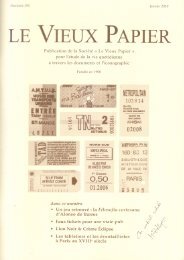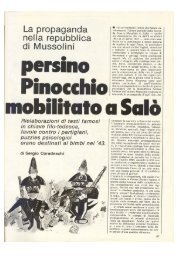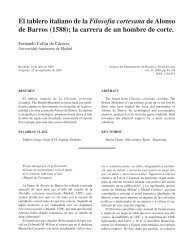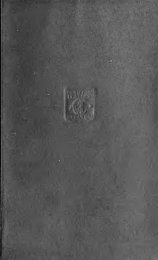Board games from the city of Vijayanagara (Hampi ... - Gioco dell'Oca.
Board games from the city of Vijayanagara (Hampi ... - Gioco dell'Oca.
Board games from the city of Vijayanagara (Hampi ... - Gioco dell'Oca.
You also want an ePaper? Increase the reach of your titles
YUMPU automatically turns print PDFs into web optimized ePapers that Google loves.
56<br />
B OARD G AME S TUDIES 6, 2003<br />
<strong>from</strong> <strong>the</strong> Fabricius’ advertisement as well as <strong>the</strong> article in Das Schwarze Korps contradicts<br />
her statement: <strong>the</strong> game was published very late in 1938 and was to be promoted only<br />
in 1939. It is most likely <strong>the</strong>refore that Rogasky was mislead by <strong>the</strong> company advertisement,<br />
which tried to promote a “big seller” right <strong>from</strong> <strong>the</strong> beginning. It seems very<br />
unlikely that <strong>the</strong> game could have been successful in <strong>the</strong> face <strong>of</strong> condemnation by <strong>the</strong><br />
SS and <strong>the</strong> resulting threats to Rudolf Fabricius.<br />
The state archive at Leipzig, where <strong>the</strong> documents concerning <strong>the</strong> fairs at Leipzig<br />
are preserved, confirmed by letter that <strong>the</strong> Fabricius company was not present at <strong>the</strong> toy<br />
fair in 1939 nor was <strong>the</strong> game promoted <strong>the</strong>re, despite <strong>the</strong> company’s previous<br />
announcement. Unfortunately no information was available concerning Fabricius’ presence<br />
at <strong>the</strong> fair at Vienna in 1939.<br />
Rumors<br />
“Juden Raus!” has been known to a handful <strong>of</strong> scholars for many years. It has been<br />
used as evidence by museums and college courses on <strong>the</strong> holocaust <strong>of</strong> <strong>the</strong> extent <strong>of</strong> anti-<br />
Semitism in Nazi Germany. In <strong>the</strong> course <strong>of</strong> our research many scholars replied that<br />
<strong>the</strong>y had “heard” or “thought <strong>the</strong>y saw somewhere” information about <strong>the</strong> game that,<br />
although interesting, cannot be substantiated. As is <strong>the</strong> case with many <strong>games</strong>, a mythology<br />
<strong>of</strong> rumors has developed around “Juden Raus!”. One rumor has it that <strong>the</strong> two existing<br />
copies were prototypes and that <strong>the</strong> game was never published, while a contradicting<br />
rumor states that “Juden Raus!” was manufactured but was so unpopular that it was<br />
given away for free. Ano<strong>the</strong>r rumor claims a third copy <strong>of</strong> <strong>the</strong> game was recently sold to<br />
a private collector through internet auction. There is even some talk <strong>of</strong> a different (and<br />
more blatant) anti-Semitic game <strong>of</strong> <strong>the</strong> period described as a “death camp version <strong>of</strong><br />
parchisi” where <strong>the</strong> goal <strong>of</strong> <strong>the</strong> game is to be <strong>the</strong> first to deliver Jews a position on <strong>the</strong><br />
game board which symbolized <strong>the</strong> place <strong>of</strong> <strong>the</strong>ir murder. Several people have claimed to<br />
have heard <strong>of</strong> this game, but no version is known to exist. Anyone with information<br />
about <strong>the</strong> rumors mentioned above are asked to contact <strong>the</strong> authors.<br />
Comments<br />
“Juden Raus!” is not a “Nazi board game” as it is sometimes called. There is no Nazi<br />
symbolism used in <strong>the</strong> game design and <strong>the</strong> article published in Das Schwarze Korps<br />
shows that <strong>the</strong> game was disdained – at least <strong>of</strong>ficially – in a major publication <strong>of</strong> <strong>the</strong><br />
most important Nazi organization. But its true history may never be known for certain<br />
and many unsubstantiated rumors about <strong>the</strong> game exist.<br />
What insights are achieved <strong>from</strong> “Juden Raus!” about Nazi culture? It is hard to<br />
imagine a family sitting at a table playing a game that taught racial hatred. Yet it seems<br />
<strong>the</strong>re were people like Rudolf Fabricius who imagined that some families would do just<br />
that. Fabricius was one <strong>of</strong> those mere supporters who thought to make some pr<strong>of</strong>it by<br />
following in <strong>the</strong> wake <strong>of</strong> Nazi anti-Semitic propaganda. Today most people react with<br />
disbelief or disgust when informed <strong>of</strong> <strong>the</strong> game’s existence. “Juden Raus!” shows that<br />
after decades <strong>of</strong> propaganda, anti-Semitism was so deeply rooted in German society in<br />
<strong>the</strong> 1930s, that someone thought it would be a good subject for a children’s game.







